#THAT FIRST PARAGRAPH
Note
Rowling isn't denying holocaust. She just pointed out that burning of transgender health books is a lie as that form of cosmetic surgery didn't exist. But of course you knew that already, didn't you?
I was thinking I'd probably see one of you! You're wrong :) Let's review the history a bit, shall we?
In this case, what we're talking about is the Institut für Sexualwissenschaft, or in English, The Institute of Sexology. This Institute was founded and headed by a gay Jewish sexologist named Magnus Hirschfeld. It was founded in July of 1919 as the first sexology research clinic in the world, and was run as a private, non-profit clinic. Hirschfeld and the researchers who worked there would give out consultations, medical advice, and even treatments for free to their poorer clientele, as well as give thousands of lectures and build a unique library full of books on gender, sexuality, and eroticism. Of course, being a gay man, Hirschfeld focused a lot on the gay community and proving that homosexuality was natural and could not be "cured".
Hirschfeld was unique in his time because he believed that nobody's gender was either one or the other. Rather, he contended that everyone is a mixture of both male and female, with every individual having their own unique mix of traits.
This leads into the Institute's work with transgender patients. Hirschfeld was actually the one to coin the term "transsexual" in 1923, though this word didn't become popular phrasing until 30 years later when Harry Benjamin began expanding his research (I'll just be shortening it to trans for this brief overview.) For the Institute, their revolutionary work with gay men eventually began to attract other members of the LGBTA+, including of course trans people.
Contrary to what Anon says, sex reassignment surgery was first tested in 1912. It'd already being used on humans throughout Europe during the 1920's by the time a doctor at the Institute named Ludwig Levy-Lenz began performing it on patients in 1931. Hirschfeld was at first opposed, but he came around quickly because it lowered the rate of suicide among their trans patients. Not only was reassignment performed at the Institute, but both facial feminization and facial masculization surgery were also done.
The Institute employed some of these patients, gave them therapy to help with other issues, even gave some of the mentioned surgeries for free to this who could not afford it! They spoke out on their behalf to the public, even getting Berlin police to help them create "transvestite passes" to allow people to dress however they wanted without the threat of being arrested. They worked together to fight the law, including trying to strike down Paragraph 175, which made it illegal to be homosexual. The picture below is from their holiday party, Magnus Hirschfeld being the gentleman on the right with the fabulous mustache. Many of the other people in this photo are transgender.
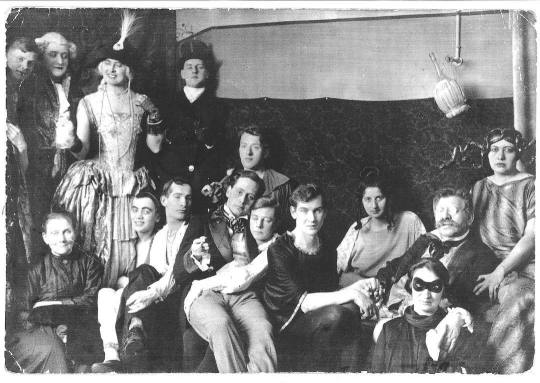
[Image ID: A black and white photo of a group of people. Some are smiling at the camera, others have serious expressions. Either way, they all seem to be happy. On the right side, an older gentleman in glasses- Magnus Hirschfeld- is sitting. He has short hair and a bushy mustache. He is resting one hand on the shoulder of the person in front of him. His other hand is being held by a person to his left. Another person to his right is holding his shoulder.]
There was always push back against the Institute, especially from conservatives who saw all of this as a bad thing. But conservatism can't stop progress without destroying it. They weren't willing to go that far for a good while. It all ended in March of 1933, when a new Chancellor was elected. The Nazis did not like homosexuals for several reasons. Chief among them, we break the boundaries of "normal" society. Shortly after the election, on May 6th, the book burnings began. The Jewish, gay, and obviously liberal Magnus Hirschfeld and his library of boundary-breaking literature was one of the very first targets. Thankfully, Hirschfeld was spared by virtue of being in Paris at the time (he would die in 1935, before the Nazis were able to invade France). His library wasn't so lucky.
This famous picture of the book burnings was taken after the Institute of Sexology had been raided. That's their books. Literature on so much about sexuality, eroticism, and gender, yes including their new work on trans people. This is the trans community's Alexandria. We're incredibly lucky that enough of it survived for Harry Benjamin and everyone who came after him was able to build on the Institute's work.
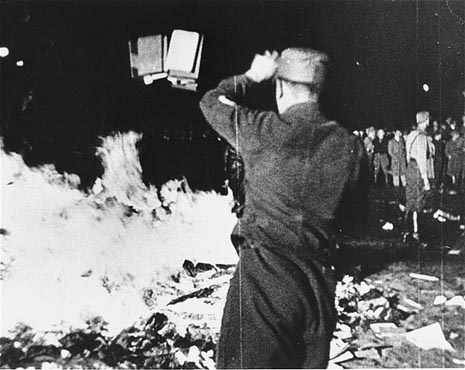
[Image ID: A black and white photo of the May Nazi book burning of the Institute of Sexology's library. A soldier, back facing the camera, is throwing a stack of books into the fire. In the background of the right side, a crowd is watching.]
As the Holocaust went on, the homosexuals of Germany became a targeted group. This did include transgender people, no matter what you say. To deny this reality is Holocaust denial. JK Rowling and everyone else who tries to pretend like this isn't reality is participating in that evil. You're agreeing with the Nazis.
But of course, you knew that already, didn't you?
Edit: Added image IDs. I apologize to those using screen readers for forgetting them. Please reblog this version instead.
#transgender#trans history#transsexual#transphobia#Magnus Hirschfeld#holocaust#holocaust denial#book burning#j.k. rowling#jk rowling#just in case you missed what i mean by all this: go fuck yourself anon :)#trans people have always existed#and we will always exist#if you really wanna pick a fight with me over well-documented history then you better bring in some sources to back your shit#queer history#queer#lgbt+#lgbta+#lgbt#lgbt history#edit: i finally got around to those damn image IDs. i am so very sorry for totally forgetting that's my bimbo moment of the month#also real quick i thought about adding an image of the actual building but the only one i can find has a Nazi parade in front of it#it was taken the day of the book burning raid and honestly if i were to include it then i'd add it to the first few paragraphs#and i think the story's better told when you uphold the hope Magnus Hirschfeld and all the researchers he worked with had#also keeps being brought up: yes Hirschfeld was a eugenicist. it was a popular belief set that was only discredited after WW2#Hirschfeld died in 1935. he literally didn't live long enough to see science turn against those beliefs and practices#considering how he changed his mind on transitions i like to think he would've changed his mind on eugenics too if he'd lived
16K notes
·
View notes
Text
anyway in the past week the irish government has voted down two motions which would have condemned the genocide in gaza.
i need everyone to stop lionising ireland as if its not also a european government with strong ties to the us. american weapons pass through shannon airport and will continue to, because yesterday the motion to stop that was voted down 83 to 50.
other governments have done much more but somehow people still act as though ireland is the ultimate palestinian ally and exempt from criticism on its handling of palestine bc it was once colonised, even though that past experience clearly isnt being taken into account by the irish government when creating policy.
i live here i know there’s a lot of public support and sympathy for palestine, which is great, but that isnt reflected in government, and i think ireland should be treated like other countries whose governments have done nothing.
#i mean i think theres also a discrepancy btwn the govt and the people on palestine bc there hasnt been a general election since early 2020#before the last few rounds of aggression by israel brought it back into mainstream western discussion#but also theres a degree of privilege in ppl not having felt the need to think abt it in 2020 yk. palestinians have been thinking abt this#since 1948#there’s also the fact that ideological support of palestine absolutely doesn’t equate to better treatment of muslims#i can promise you this country is still very islamophobic and racist no matter where you go#and i feel like that gets glossed over when ireland is treated as the ultimate ally of palestine when. realistically. it isnt#be quiet b#sorry this is like paragraphs but im becoming frustrated 👍#ive seen other posts abt this im not the first to say it they were just unrebloggable. understandably
5K notes
·
View notes
Text
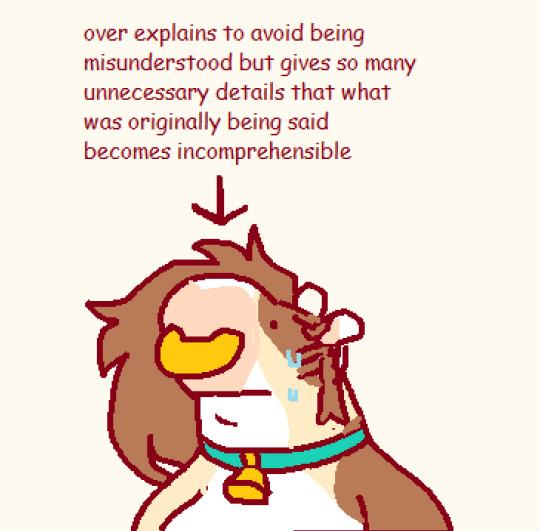
#mspaint mouse doodlie#a mood as ive been coming out of my shell more and talking to people lately#(says something nice) (feels the need to clarify that i'm not flirting even though there's no reason to assume i was in the first place)#(tries to make a post about art being unable to be judged objectively) (writes 6+ paragraphs in my notes before condensing it to post)#this isnt me trying to be self deprecating btw i just know i do this :.] bc if i'm misunderstood i'll die.#oc: cow#fursona#furry#my art
3K notes
·
View notes
Text
sister sitting on your lap during a very long and bumpy drive and you'd hope she doesnt notice how uncomfortable it might be getting for you. unfortunately she does, and she starts making her little jumps up more exaggerated, trying to fix herself on your lap because she apparently keeps "sliding off"
eventually you're left alone in the car. you gaze out the window, however your sister has other plans. without a second's notice she unzips your pants, lifts her skirt, and takes your length inside of her. is she crazy?! as good as she feels, you're terrified of being caught. you try to push her off, only for her to push her weight against you. "pushing me off? you want me to scream? they'll come rushing back. how are you gonna explain to them why your sister is crying and your balls deep in her?"
the thought sends a shiver down your spine. you shut up and let her have her fun.
the drive is 3 more hours.
#hazy stories#ONCE MORE. THIS WAS SUPPOSED TO STOP AT THE FIRST PARAGRAPH.#siscon#sibcest#siscest#sibcon
2K notes
·
View notes
Text
“Feel free to share your positive feelings about the film on Twitter after the screening,” said the usher introducing the London press preview screening of Barbie, Greta Gerwig’s Mattel-produced film. The embargo for reviews, however, would not be lifted until two days later, closer to the film’s release. The audience generally didn’t bat an eyelid and it wasn’t the first time my colleagues and I had heard such directives, yet we were left feeling censored: if they won’t allow for our negative reactions, why should they get our positive ones?
The purpose of this strategy barely needs specifying: in addition to the film’s omnipresent marketing campaign, positive reactions on social media were to seal the deal and ensure that the most dubious potential spectators would be persuaded to turn up to the cinema on the opening weekend, the most crucial days for a film’s box office success. The fact that the audience at this preview screening consisted mostly of influencers was another blatant marketing strategy, which would not have been as insulting were it not for the fact that it meant many film critics were unable to see the film before its release. The phenomenon occurred in other cities as well. A few days before the film’s release, Parisian writers were dumbfounded to see some colleagues sharing glowing takes on the film on Twitter, after being told there would be no advance screenings for any of the press. Moreover, what were presented as exclusive interviews with the cast turned out to be prerecorded and pre-approved by the studio. Ahead of its release, the film was to be seen only through pink-tinted glasses.
While it is customary for film studios to try to control the narrative by organising advance screenings if they believe in a film or avoiding them if they don’t, the methods employed for the release of Barbie were more extreme. They are symptomatic of a trend that has been evolving over the past few years and that concerns not only the film criticism profession, but culture at large. If all discussion of a film’s merits before release is left to influencers, whose driving ambition is to receive free merchandise by speaking well of the studio’s products, what can we expect the film landscape to look like? Where will engaging, challenging and, if not completely unbiased then at least impartial conversation about cinema take place, and how is the audience to think critically of what is being sold to it?
#READ THE REST but I think these first 3 paragraphs are best to get you interested in doing that :)#reading
2K notes
·
View notes
Note
if you had to live even one day as a biological homosexual male (don't play dumb or smart, you know what i'm referring to), you'd fucking k!ll yourself once you realize how miserable it is.
right, because trans people have famously never had to survive being so miserable that we feel like we’d be better off dead, and transphobia totally doesn’t compound with homophobia to make life even harder. i mean, fuck intersectionality, right? obviously being trans on top of being gay would make things easier, not harder. silly me. my stupid little female brain just can’t possibly comprehend how hard your life must be. of course i would be too fragile and weak to survive the hardships that you and only you experience. really, we should all give you a standing ovation for surviving more suffering than anyone else on the entire earth has ever had to experience.
…anyway, this whole stolen valor angle of anti-transmasculinity is weird as hell. big “back in my day we had to walk to school up hill both ways in the snow” energy. have you ever considered that maybe, just maybe, you don’t have some sort of monopoly on suffering? because believe it or not, finding community with other people who have faced similar hardships is actually a really healing experience when you let yourself do it, and would definitely be far healthier than whatever the fuck you’ve got going on here. i’d strongly recommend trying it sometime. if you get the stick out of your ass, you’ll realize we’re in this together, and that’s an incredibly powerful thing.
#HEAVY sarcasm in the first paragraph if you couldn’t tell#anon hate#examples of transandrophobia#transandrophobia#transandromisia#transmisandry#virilmisia#virilphobia#anti transmasculinity#transmascphobia#tehmism#<- gonna start using that for posts highlighting this kind of anti-transmasculine cis gay man#i feel like it deserves its own tag
526 notes
·
View notes
Text
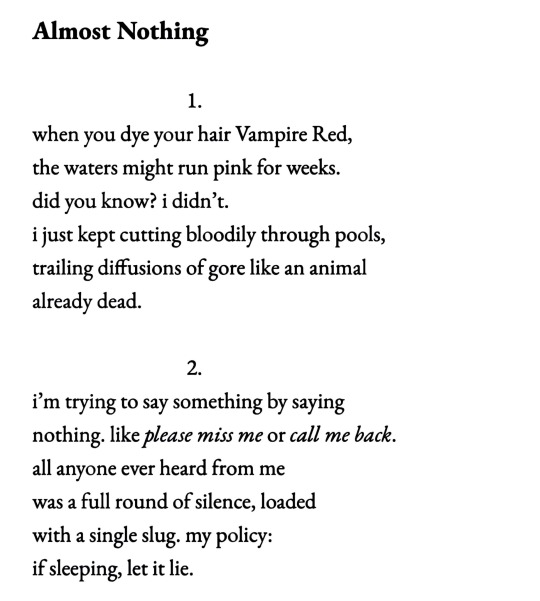

almost nothing !!
#zoe's notebook#poets on tumblr#spilled ink#poetsandwriters#poetscommunity#poets corner#car seat headrest ref in the last paragraph is on purpose#also i took the first lines of one of my old poems and repurposed it<33 hope i succeeded in breathing new life in the bastard
2K notes
·
View notes
Text

@just-another-linguist and @melestasflight both requested Fingon which was v exciting. Fingon is one of the characters that really stuck with me the first time I read the Silm, but I’ve never actually drawn him. In my mind this is like a Valinor-era Fingon!
#fingon#silmarillion#silm art#silmarillion fanart#tolkien fanart#candlesart#here down in the valley#I’d started reading the silm after I’d just finished reading this v extensive aragorn&legolas series#that mostly just involved one of them getting whumped and the other having to rescue him#it was a fantastic time. ‘mellon’ was possibly in the title#anyway it was pure h/c w a side of road trips and so when fingon went on his road trip to rescue maedhros#my brain immediately supplemented the like paragraph of description w the tens of thousands of words of a&l fic I’d just read#which. given that my first read of the silm was mostly just a blur of names and locations#made fingon and his rescue incredibly memorable
429 notes
·
View notes
Text
If you are a terf in the locked tomb fandom, the fandom for the series that invented its own gender binary and then made a character who was transgender in the context of that binary*, the fandom for the series that has Pyrrha "Daddy's own treasures" Dve and Palamedes "very irritating wife" Sextus in it, the fandom for the series where those two characters literally pilot bodies belonging to someone of the "opposite" gender, you are a fucking rube and a dipshit even for a terf, and given that the terf movement as a whole thinks it's saving women from patriarchy by allying with fascists, that's saying something.
*yes coronabeth is a trans cav and that is an identity I've decided exists in the context of the series. If you're wondering what a trans necromancer is, it's Harrow Nova
511 notes
·
View notes
Text
No, you don't understand, the fact that "Terminals play music to lure machines" is even a theory, in universe, implies that Machines being capable of appreciating music is not just canon, it is a fact known and accepted by the humans who made them in the first place.
Please, listen to me, they put appreciation of art into their blood powered tools of war and it's the only reason why their self expression yet finds appreciation even after humanity's end.
Just, just be with me for this. V1s creator might have been into drum and base. Ultrakill OST might just be as canon as the graphic settings (see: Sentry codex entry).
V1 has a fucking "tunes to listen to at work" playlist, and a dedicated song for throwing hands with V2 on it. But it also has a Gabriel theme, and it's creator couldn't possibly have met him. And the songs are so fitting for the stages in general... omg
V1 has a fucking composer AI. It's creator made their super weapon, the "Supreme Machine" a fucking musician. V1 makes music it commits mass murder to. It made a music for Gabriel and V2. 2 songs with themes and motifs for each of its rivals.
Wait wait, fuck. Fuck, wait.
V1
Composed the god damn Requiem motif. It took a look at Lust and went "ahh, yes, a gut wrenching violin solo for this place". And then it put that motif into Order. Which means...
Which means V1 understands the tragedy of the Lust layer and King Minos. Which mean the mindles-ness of its carnage across Hell isn't total. It understands how sad it is enough to make art about it.
I need a moment.
#i only planned for the first paragraph this got so out of hand#ultrakill#analysis#v1 ultrakill#v2 ultrakill#gabriel ultrakill#minos ultrakill
3K notes
·
View notes
Text
The Architecture of Rain World: Layers of History
A major theme in Rain World's world design that often goes overlooked is the theme of, as James Primate, the level designer, composer and writer calls it, "Layers of History." This is about how the places in the game feel lived-in, and as though they have been built over each other. Here's what he said on the matter as far back as 2014!

The best example of this is Subterranean, the final area of the base game and a climax of the theme. Subterranean is pretty cleanly slpit vertically, there's the modern subway built over the ancient ruins, which are themselves built over the primordial ruins of the depths. Piercing through these layers is Filtration System, a high tech intrusion that cuts through the ground and visibly drills through the ceiling of the depths.
Two Sprouts, Twelve Brackets, the friendly local ghost, tells the player of the "bones of forgotten civilisations, heaped like so many sticks," highlighting this theme of layering as one of the first impressions the player gets of Subterranean. Barely minutes later, the player enters the room SB_H02, where the modern train lines crumble away into a cavern filled with older ruins, which themselves are invaded by the head machines seen prior in outskirts and farm arrays, some of which appear to have been installed destructively into the ruins, some breaking through floors.
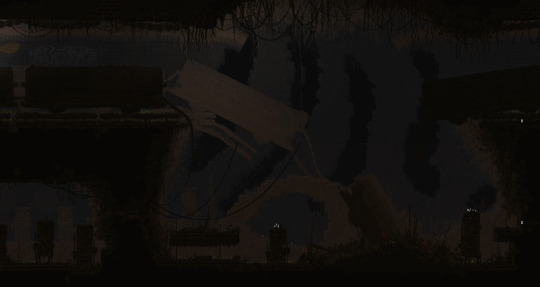

These layers flow into each other, highlighting each other's decrepit state.
The filtration system, most likely the latest "layer," is always set apart from the spaces around it. At its top, the train tunnels give way to a vast chasm, where filtration system stands as a tower over the trains, while at the bottom in depths, it penetrates the ceiling of the temple, a destructive presence. (it's also a parallel to the way the leg does something similar in memory crypts, subterranean is full of callbacks like that!)


Filtration system is an interesting kind of transition, in that it is much later and more advanced than both of the areas it cuts between. This is a really interesting choice from James! It would be more "natural" to transition smoothly from the caves of upper subterranean to the depths, but by putting filtration system in between, the two are clearly demarcated as separate. The difference in era becomes palpable, the player has truly found something different and strange.
Depths itself is, obviously, the oldest layer not only of subterranean but of the game itself. The architecture of Depths has little to do with the rest of the game around it, it's a clear sign of the forgotten civilisations that our friend Two Sprouts, Twelve Brackets showed us, there's not actually that much to say about it itself, it's mostly about how it interacts with the other layers of subterranean.
That said, Subterranean is far from the only case of the theme of layers of history. It's present as soon as the player starts the game!
The very first room of the game, SU_C04, is seemingly a cave. It is below the surface, the shapes of it are distinctly amorphous rather than geometric. (well. kind of, it doesn't do a very good job of hiding the tile grid with its 45 degree angles.)

But let's take a closer look, shall we?

See that ground? it's made of bricks. The entire cave area of outskirts is characterised by this, the "chaotic stone" masonry asset is mixed with brickwork, unlike the surface ruins which are mostly stone. This, seemingly, is an inversion of common sense! The caves are bricks and the buildings are stone. This is not, however, a strange and unique aspect but a recurring motif.
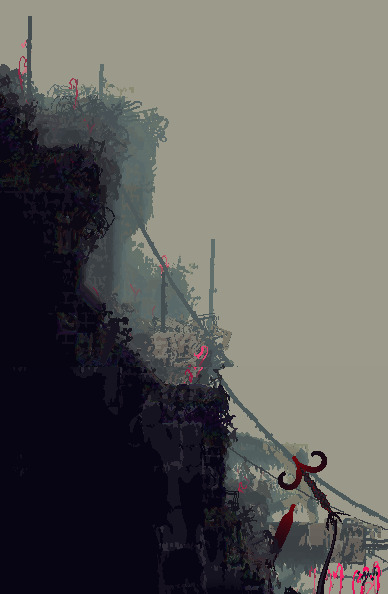
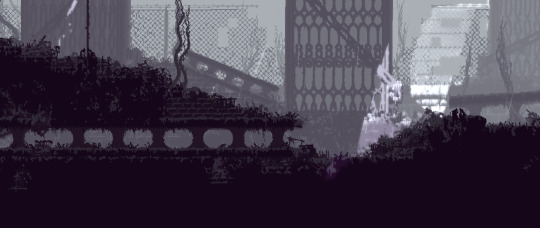
This occurs enough in the game for it to be clearly intentional, but why would materials such as bricks be used in otherwise natural looking terrain?
The answer lies in the "Layers of History" theme. This is in fact, something that happens in real life, and it's called a tell
To be specific, a tell is a kind of mound formed by settlements building over the ruins of previous iterations of themselves. Centuries of rubble and detritus form until a hill grows from the city. Cities such as Troy and Jericho are famous examples. The connections to the layers of history theme are pretty clear here, I think. Cities growing, then dying, then becoming the bedrock of the next city. The ground, then, is made of bricks, because the ground is the rubble of past buildings. The bones of forgotten civilisations, heaped like so many sticks!
#rain world#rainworld#rain world lore#rainworld lore#rw lore#rw#subterranean my beloved#thank you to videocult for making the first survival game themed around stratigraphy and new york city rats#i would've gone on for another paragraph about how OE relates to this but like.#that's dlc stuff#and i still think of the dlc stuff as modded content lol#better to keep it separate#also this analysis is not comprehensive! the layers of history stuff is common throughout#there's farm arrays there's the relationship between shaded citadel and five pebbles there's the stuff buried under garbage wastes#so much more#unfortunately i do not have much energy lol
495 notes
·
View notes
Text
When people say they struggle with keeping track of all the tone tags (the ones like /j or /gen), everyone who disregards that by responding "it's just memorizing some abbreviations/acronyms, it's not that hard, stop complaining" is ableist and a fucking hypocrite. If you're going to advocate for accessibility, advocate for accessibility for all of us.
You can't claim to be an ally to neurodivergent and disabled people and then shit on us for our symptoms. If you actually care about helping us, why aren't you listening when we say we struggle with something? It's never okay to tell disabled people they should be able to do something they can't, that it's not that hard, but it's especially not okay if you do so while pretending to support disabled people.
Also, in addition to the "it's not that hard" statement being ableist, it's utter bullshit. There are so many tone tags to keep track of and memorize. I did a quick google search and one of my top results had ninety one tone tags. That's a lot. That's probably a lot even for a neurotypical person, and I'm not a neurotypical person. I struggle to remember a lot of basic, necessary tasks, so I really can't memorize ninety one tone tags.
Especially when some of them are incredibly ambiguous- only one letter? Acronyms or abbreviations at least give you some clues, one letter tone tags are so incredibly confusing. Like, what does /t mean? There are a lot of words that start with T! (This is a rhetorical question. I know /t means "teasing," but I only know the answer because figuring that out was a memorably frustrating experience.)
And /t is just one example of a tone tag I learned because I kept seeing it in conversation and not understanding and being really confused and frustrated. I can't tell you the number of times I've been messaging someone on discord, and they say something with a tone tag I don't recognize, and I just open a new tab to google the meaning, which is where I find lists like the one above. I usually rely on google instead of asking the person what they meant, because I feel stupid and embarrassed for not knowing this code that everyone else seemingly gets.
Which is exactly how it feels when I don't understand someone's tone in real life! Confused and frustrated and ashamed. And tone tags were supposed to help neurodivergent and disabled people not feel that way, so I don't know how we reached a point where they cause those feelings in many of us.
I can't deny that tone tags are a useful accessibility tool for some. If you find them helpful, it's genuinely good that you have that resource. But they're not accessible for all of us. It's incorrect to act like tone tags are a perfect way to communicate, and it's ableist to disregard our struggles with them and tell us to just try harder.
Either listen to those of us who say they have trouble understanding tone tags, or stop pretending you actually give a shit about accessibility.
#this was meant to be just those first two paragraphs about ableism + hypocrisy but then i kept on rambling. i am incapable of shutting up#anyway. had some thoughts about the disk horse and then i had more thoughts and more thoughts and more thoughts#tone tags#tone indicators
2K notes
·
View notes
Note
I guess the thing that makes me not so fond of Jon's addiction allegory is that it's only coherent to a certain extent? Like I think people sometimes forget that he's actively violating these people
anon, through no fault of your own you have accidentally hit upon my sleeper agent trigger phrase. I have layers of answers to this.
so first off, yeah, it's not a 1:1 direct metaphor, it's a soupy dream logic fantasy plot device with flavors of a lot of different things. there's quite a lot of addiction in there, there's some abuse of power, there's some cyclical nature of trauma, there's a dash of disability, there's a few notes of gendered violence, there's a good bit of just. violence violence and being kind of a motherfucker because goddammit it feels good to be an active agent about something in your life, even if it's just choosing to be a worse version of yourself than you strictly need to be. a lot of tma's worldbuilding is very allegorical, but apart from aspects of individual statements nothing really matches up quite 1:1 with a real world counterpart, and if more things did then it probably wouldn't be a fantasy show anymore.
secondly. okay to contextualize this answer a little bit I have a kind of hypothetical video essay project about vampirism and addiction that I like to spend a few hours thinking about every so often but am almost certainly never going to make because the full research burden required is a lot higher than I actually have the time to properly do. but because of that I've spent a lot of time sorting through why framing vampires as addicts really works for me in a way that it doesn't seem to for everyone, and I think a lot of my thoughts on that also apply to jon. there's going to be a bit of a detour here before we get back to talking about tma, but we'll get there, I prommy.
I've seen a lot of people take issue with various paranormal addiction allegories because, a lot of the time, the act that is meant to metaphorically represent the act of use itself is something that is directly and inherently harmful to others, e.g. drinking human blood, handing over power to your hedonistic Evil alter ego, holding the cursed amulet and going crazy going stupid, slurping trauma out of the head of some guy you ran into on a boat to norway, etc., and yeah, I do get that. substance use is not inherently harmful like that to anyone except sometimes the user themself, and addicts are not inherently fucked up and destructive people; those are dangerous stereotypes that often lead to the demonizing of a whole group of sick people.
here's the thing for me, though: those are definitely truths I want explored and represented when it comes to portrayals of non-allegorical actual addicts, but fantasy fiction isn't for showing the world as it is, it's for showing a subjective fun house mirror version of reality where certain aspects are minimized and magnified depending on how it feels to live through it. and yes, absolutely in real life drug use is not an inherently evil act and it does not make you an inherently evil person, but... doesn't it kind of feel like that? sort of? absolutely no one is living their best life nor on their best behavior while experiencing any kind of major mental illness episode, and when it comes to addiction you've got a very clear tangible symbol of when The Episode is happening that it feels like you have much more control over than when it comes to other illnesses. it's also a thing where people are a lot more likely to be openly angry and distrustful of you if they find out it's happening. so you mix together the ideas of "I know I get worse as a result of doing this one specific thing" + "I act less like myself when I'm using, it rearranges my priorities and I care less about hurting people because that's what happens when you're experiencing The Horrors" + "society at large/people directly around me are pretty quick to say that doing this is evil," and you get the subjective emotional result of "I hurt people by using and it makes me monstrous." I tend to respond to those kinds of paranormal allegories like they're just cutting out the middle man of those subjective fears. "using makes me monstrous" -> "using is monstrous."
anyway. jon archivist.
don't get me wrong, I totally understand if this aspect of metaphor doesn't gel for some people and they only like taking it exactly as far as the text explicitly makes them, but I really get a lot out of reading jon's connection to the fears as addiction precisely because he does genuinely awful things to people as a result of it. he's a person in a very bad physical and mental place with little to no support who is constantly being told by both allies and enemies that he's already a monster just by being alive, and he copes with that by secretly falling further and further into an compulsive act of consumption that skews his priorities and makes him care less about hurting people because at least sometimes getting to be the cause of pain makes him feel a little bit less powerless when he has to be the subject of pain the rest of the time. then he's found out and is made to stop, and he has to grapple not just with the physical toll of withdrawal but with knowing there is a not insignificant part of him that will excuse any act of malice if he knows he'll feel better afterwards.
the end of tma is very explicit in the fact that the rules of its world are shaped by the subjective worst fears of those who live in it, it's "an exercise in unreliably reality" as jonny sims put it once, and I think that principle extends backwards in some ways to apply to the rest of the show. I don't think the fact that there are only entities of fear and not hope or love is meant to be a full commentary on the total nature of the real world, it's a reflection of what fear and suffering can make the world feel like. eric and melanie both go to really harsh extremes to extricate themselves from the fears and live peaceful lives, and in both cases something happens that foils their plans (getting murdered + the apocalypse, respectively), but I don't think the intended message is to say that is definitively how real life works, they are metaphors for the limits of individual agency in larger systems and represent two types of worst-case-scenarios. similarly, I don't think reading jon as an addict implies that addiction inherently involves violence or that the reactions of those around him were completely unjustified, it's just a subjective exploration of the kinds of fears that can come with addiction dialed up to 100.
#also to be clear after the first paragraph I'm using 'you' in a general sense not directly to You The Anon Who Sent This#I'm not trying to insinuate anything about whether You The Anon Who Sent This does or doesn't have any experience w substance use#tma#answered#anons
794 notes
·
View notes
Text
eddie’s the kinda guy who could get off with no material aside from your name with his last name playing in his head over and over.
after marrying you he’d jerk off to your wedding photos when you’re away and on your anniversary he’d beg you to wear the dress, he’d wear his suit and you’d fuck in your clothes.
post nut you always tell him that you’re not doing this again, that it’s too risky and you don’t wanna ruin your outfits. but every year when your anniversary comes around you find yourself anticipating and craving the sight of eddie, all dressed up in his tux, moaning your name as his hips slam into you.
#this was supposed to end after the first paragraph#but uh#anyway#eddie munson#eddie munson smut#eddie munson imagine#eddie munson blurb#eddie munson x reader smut
759 notes
·
View notes
Text
MP100 does such a good job of committing to its theme that psychic powers don't make you better than anyone else. It's really common for media with magic or superpowers to pay lip service to the idea that the people who have them aren't any better than the people who don't, but then have their actual plots constantly undercut that message.
But not Mob! It takes its non-powered characters seriously; Mob's time with the Body Improvement Club and his friendship with Tome and the other Telepathy Club kids are just as important to his character development as any big psychic battle. On multiple occasions, Reigen's big contributions happen specifically because he *isn't* psychic--I'm thinking of the Shimazaki fight and the scene where he realizes Minori is possessed, but there are others.
And even when there are fights, they're ideological as much as they are physical. That's why Mob defeats Serizawa with an offer of friendship. That's why in the confrontation with Dimple in broccoli arc, Mob wins by *giving up* his powers, recognizing that they were preventing the two of them from actually talking. And that's why the thing that stops ???%'s rampage isn't another psychic; it's Reigen finally admitting to his own powerlessness.
#mp100#it's. good.#(no use trying to guess what i'm vaguing in the first paragraph there are like 5 things just off the top of my head)#(this is also why i'm completely uninterested in fics that give psychic powers to other characters; it r#it feels like they're really missing the point#and why i set up the emergency contact fic with a totally non-esper ensemble)#mob meta
2K notes
·
View notes
Text
so on thursday alex jones once again referred to the sandy hook shooting on his show as "synthetic". he edited that out of the episode on his website, but the comment went out over the radio and is still in the version of the episode on the radio distributor's website. this morning pattis (jones' lawyer) requested a sidebar in which he informed the judge that alex jones was going to do another press conference and that pattis had nothing to do with it. jones referred to the default judgment as "a lie" and once again called it a fake trial.
inside the courthouse, francine wheeler testified about the loss of her son ben at sandy hook. at a support meeting for mothers who'd lost children to gun violence, another mother told wheeler that she didn't belong there because her son wasn't real and she was a crisis actor. her other son, ben's older brother, survived the shooting and remains anonymous for his own safety. she has not yet figured out how to explain to her 8 year old why they have to be so careful.
#original#knowledge fight#everyone's going to want to focus on the events of the first paragraph#because - in fairness - what the fuck#but the actual trial that's happening while jones grandstands is just. unspeakably devastating.
5K notes
·
View notes